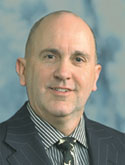AVMA, AVMF announce new Congressional Science Fellow
Dr. Harry Michael Chaddock was selected as the AVMF/AVMA Congressional Science Fellow for 2001-2002. Dr. Chaddock was selected from four candidates interviewed for the position. Dr. Samuel Strahm, chairman of the selection committee, said, "The committee was impressed with all the candidates. Our selection of Dr. Chaddock is a statement of his exceptional skills, diverse background, and strong leadership abilities." A 1973 graduate of Michigan State University, Dr. Chaddock has had several careers within the profession of veterinary medicine, including private practice as an employee and owner. He has been a technical service veterinarian working for a worldwide company representing areas of nutrition, health, economics, and livestock management, with an emphasis on problem solving and disease prevention. Currently Dr. Chaddock serves as the state veterinarian for the Michigan Department of Agriculture, developing and implementing public policy. He also is an adjunct professor for the College of Veterinary Medicine at Michigan State University, heightening student awareness of nonpractice career options in such areas as regulatory veterinary medicine and state/federal/industry cooperative disease eradication programs. In organized veterinary medicine his appointments have included chairing the AVMA PAC Policy Board, serving as Michigan's delegate to the AVMA House of Delegates, and representing state and federal government salaried veterinarians on the House Advisory Committee. His background with the PAC Policy Board has allowed him to experience the political and legislative process in Washington, DC, which will enable him to make a smooth transition to his position as a Congressional Science Fellow. Regarding his selection, Dr. Chaddock had this to say, "The knowledge and experiences I will gain as a fellow will enable me to continue to be even more effective in the future as an asset to our profession and society in the pursuit of quality, science-based public policy." | ||
